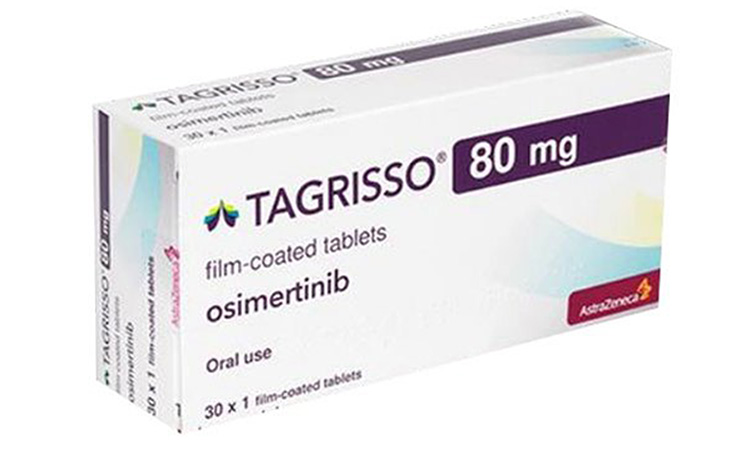Tagrisso (osimertinib) vs Keytruda (pembrolizumab)
Tagrisso (osimertinib) vs Keytruda (pembrolizumab)
Tagrisso (osimertinib) and Keytruda (pembrolizumab) are both targeted therapies used in the treatment of certain types of cancer, but they work in different ways and are used for different indications. Tagrisso is a tyrosine kinase inhibitor specifically designed to target the EGFR mutations in non-small cell lung cancer (NSCLC), and is often used in patients who have specific genetic alterations. Keytruda, on the other hand, is an immunotherapy drug that works by blocking the PD-1 pathway, thereby boosting the immune system's response against cancer cells, and is used for a variety of cancers, including NSCLC, but typically for those with high PD-L1 expression or specific genetic markers. For someone deciding which medicine is right for them, it is crucial to undergo genetic testing to determine the presence of EGFR mutations for Tagrisso or PD-L1 expression and other biomarkers for Keytruda, as these tests will guide the oncologist in choosing the most appropriate therapy based on the patient's specific cancer profile.
Difference between Tagrisso and Keytruda
| Metric | Tagrisso (osimertinib) | Keytruda (pembrolizumab) |
|---|---|---|
| Generic name | Osimertinib | Pembrolizumab |
| Indications | Non-small cell lung cancer (NSCLC) with specific EGFR mutations | Various cancers including melanoma, NSCLC, head and neck squamous cell cancer, classical Hodgkin lymphoma, urothelial carcinoma, gastric cancer, cervical cancer, and others |
| Mechanism of action | EGFR tyrosine kinase inhibitor | PD-1 blocking antibody |
| Brand names | Tagrisso | Keytruda |
| Administrative route | Oral | Intravenous |
| Side effects | Diarrhea, rash, dry skin, nail toxicity, stomatitis, decreased appetite, etc. | Fatigue, cough, nausea, itching, rash, decreased appetite, constipation, joint pain, etc. |
| Contraindications | None known specifically; use caution in patients with interstitial lung disease or QT prolongation | Should not be used in patients with severe hypersensitivity to pembrolizumab or its excipients |
| Drug class | Antineoplastic agent, kinase inhibitor | Antineoplastic agent, immune checkpoint inhibitor |
| Manufacturer | AstraZeneca | Merck & Co. |
Efficacy
Tagrisso (Osimertinib) Efficacy in Treating Lung Cancer
Tagrisso (osimertinib) is a third-generation, irreversible epidermal growth factor receptor tyrosine kinase inhibitor (EGFR TKI) that has shown significant efficacy in the treatment of non-small cell lung cancer (NSCLC) with specific EGFR mutations. Clinical trials have demonstrated that osimertinib is effective in patients with NSCLC who have the T790M mutation, which is a common mutation associated with resistance to earlier generations of EGFR TKIs. In the AURA3 study, osimertinib significantly improved progression-free survival compared to platinum-based chemotherapy in patients with T790M-positive advanced NSCLC who had disease progression after first-line EGFR TKI therapy.
Moreover, osimertinib has also been studied as a first-line treatment in NSCLC patients with EGFR mutations. The FLAURA trial compared osimertinib to standard EGFR TKIs (erlotinib or gefitinib) in this patient population. Results indicated that osimertinib substantially extended progression-free survival and had a more favorable safety profile than the comparator EGFR TKIs. This has led to its approval as a first-line treatment option for patients with metastatic NSCLC harboring EGFR exon 19 deletions or exon 21 L858R mutations.
Keytruda (Pembrolizumab) Efficacy in Treating Lung Cancer
Keytruda (pembrolizumab) is an anti-PD-1 (programmed death receptor-1) therapy that has shown efficacy in the treatment of various types of cancer, including NSCLC. Pembrolizumab works by enhancing the immune system's ability to detect and fight tumor cells. It has been approved for use in patients with metastatic NSCLC whose tumors express PD-L1 with a tumor proportion score (TPS) of 1% or more, and who have previously undergone chemotherapy, as well as for the first-line treatment of patients with a high PD-L1 expression (TPS of 50% or more) without EGFR or ALK genomic tumor aberrations.
Clinical trials such as KEYNOTE-024 have demonstrated that pembrolizumab significantly improved overall survival and progression-free survival compared to chemotherapy in previously untreated patients with high PD-L1 expression. Additionally, KEYNOTE-189 and KEYNOTE-407 trials have shown that adding pembrolizumab to standard chemotherapy improves survival outcomes in patients with metastatic nonsquamous and squamous NSCLC, respectively, irrespective of PD-L1 expression levels. These studies have established pembrolizumab as a standard of care in the first-line setting for patients with high PD-L1 expression and as a combination therapy with chemotherapy in NSCLC.
Regulatory Agency Approvals
Tagrisso
-
European Medical Agency (EMA), European Union

-
Food and Drug Administration (FDA), USA

-
Health Canada

-
Therapeutic Goods Administration (TGA), Australia

-
Medsafe (NZ)

Keytruda
-
European Medical Agency (EMA), European Union

-
Food and Drug Administration (FDA), USA

-
Health Canada

-
Therapeutic Goods Administration (TGA), Australia

-
Medsafe (NZ)

Access Tagrisso or Keytruda today
If Tagrisso or Keytruda are not approved or available in your country (e.g. due to supply issues), you can access them via Everyone.org.
How it works

Make an enquiry
Choose the medicine you want to buy, answer a couple of questions, and upload your prescription to speed things up. We’ll get back to you within 24 hours.


Make an enquiry
Choose the medicine you want to buy, answer a couple of questions, and upload your prescription to speed things up. We’ll get back to you within 24 hours.


Breeze through the paperwork
We'll guide you through the required documents for importing unapproved medicine, ensuring you have all the necessary information.


Get a personalized quote
We’ll prepare a quote for you, including medicine costs and any shipping, administrative, or import fees that may apply.


Receive your medicine
Accept the quote and we’ll handle the rest - sourcing and safely delivering your medicine.

Some text on this page has been automatically generated. Speak to your physician before you start a new treatment or medication.
Let's talk
If you have any questions, call us or send us a message through WhatsApp or email:
Contact us




